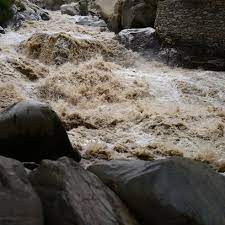Flash Flood Near Nathatop Kills Two Teachers in J&K: A Tragedy Rooted in Climate Risk
By: Javid Amin | 30 July 2025
From Duty to Disaster: Two Teachers, One Unforgettable Loss
What began as a routine training assignment ended in unimaginable tragedy. On July 30, Jagdev Singh (37) and Sanjay Kumar (39)—both government school teachers—lost their lives to a sudden flash flood in Ramban district, Jammu & Kashmir.
Hailing from Ghordi village in Udhampur, the duo had been attending a three-day training program at the District Institute of Education and Training (DIET), Kud. Their journey back after the day’s session turned fatal as extreme weather unleashed its fury on the Nathatop-Sanasar road, one of the most scenic yet perilous mountain routes in the region.
The Sequence of Events: Sudden Rain, Swift Loss
-
Training Day Ends: Around evening, after the first day’s training, Jagdev and Sanjay began their return journey on a motorcycle, despite worsening weather conditions.
-
The Fatal Stretch: Near Jalebi Morh, a gushing mountain stream, swollen by relentless rainfall, surged over the road.
-
Swept Away: Eyewitnesses and locals believe the pair was overwhelmed by the sudden deluge, swept hundreds of meters downstream before anyone could respond.
-
Discovery: The next morning, a villager spotted their abandoned bike, leading to the tragic recovery of their bodies nearly 300 meters away.
Their loss has sent shockwaves through J&K’s teaching community, and plunged two families into mourning. They weren’t adventurers or tourists—they were public servants doing their jobs, caught in a force beyond their control.
A Pattern Repeats: Climate Chaos Meets Fragile Infrastructure
While this incident is deeply personal, it also points to a larger, recurring danger:
climate volatility in ecologically sensitive regions. In the last few years:
-
Flash floods and landslides have become more frequent across J&K and Ladakh, especially during July–September.
-
Ramban, Doda, and Kishtwar remain chronically vulnerable, lacking enough protective barriers, drainage, or early warning systems.
-
Motorable roads, built decades ago for sparse traffic, are now overburdened, unmonitored, and perilously exposed to nature’s wrath.
According to environmentalists, unplanned road-cutting, deforestation, and inadequate stormwater planning are aggravating natural disasters in mountainous regions.
Systemic Fallout: School Closures, Exam Delays, and Emotional Trauma
The incident’s aftershocks have rippled across the education sector:
-
Schools in multiple districts were closed due to inclement weather and road blockages.
-
The Class 12 board exams were postponed in both Jammu & Kashmir and Ladakh as authorities prioritized safety.
-
The teaching community—already stretched thin—now grapples with emotional trauma and fear, especially in rural, disaster-prone zones.
What Must Be Done: Safety, Science, and Sensitivity
The tragedy of Jagdev and Sanjay raises urgent questions:
01. Should Teachers Be Traveling During Weather Warnings?
Administrative protocols must evolve to factor in real-time weather data and issue mandatory travel advisories for government employees.
02. Is the Infrastructure Prepared for Extreme Events?
Mountain roads like Nathatop-Sanasar need:
-
Retaining walls
-
Stream diversion channels
-
Visible flood markers and barricades
These aren’t luxuries—they’re lifelines.
03. Can We Equip Locals and Public Servants with Early-Warning Tools?
A simple mobile-based flood alert system linked to IMD or local disaster cells could save lives. Investing in community-based disaster preparedness is now non-negotiable.
04. Is Climate Change Being Taken Seriously Enough in Hill States?
As J&K grapples with erratic rainfall, glacier melt, and landslide surges, climate resilience must move beyond paper plans to district-level action.
A Final Word: Their Death Must Not Be in Vain
Jagdev Singh and Sanjay Kumar didn’t die in war or pandemic—they died in service, in silence, in a situation that was entirely preventable. Their names should not fade into another statistic buried under the next monsoon.
This is not just a weather incident—it’s a policy failure, a climate warning, and a call to humanize how we treat our teachers, our terrain, and our travel decisions.



